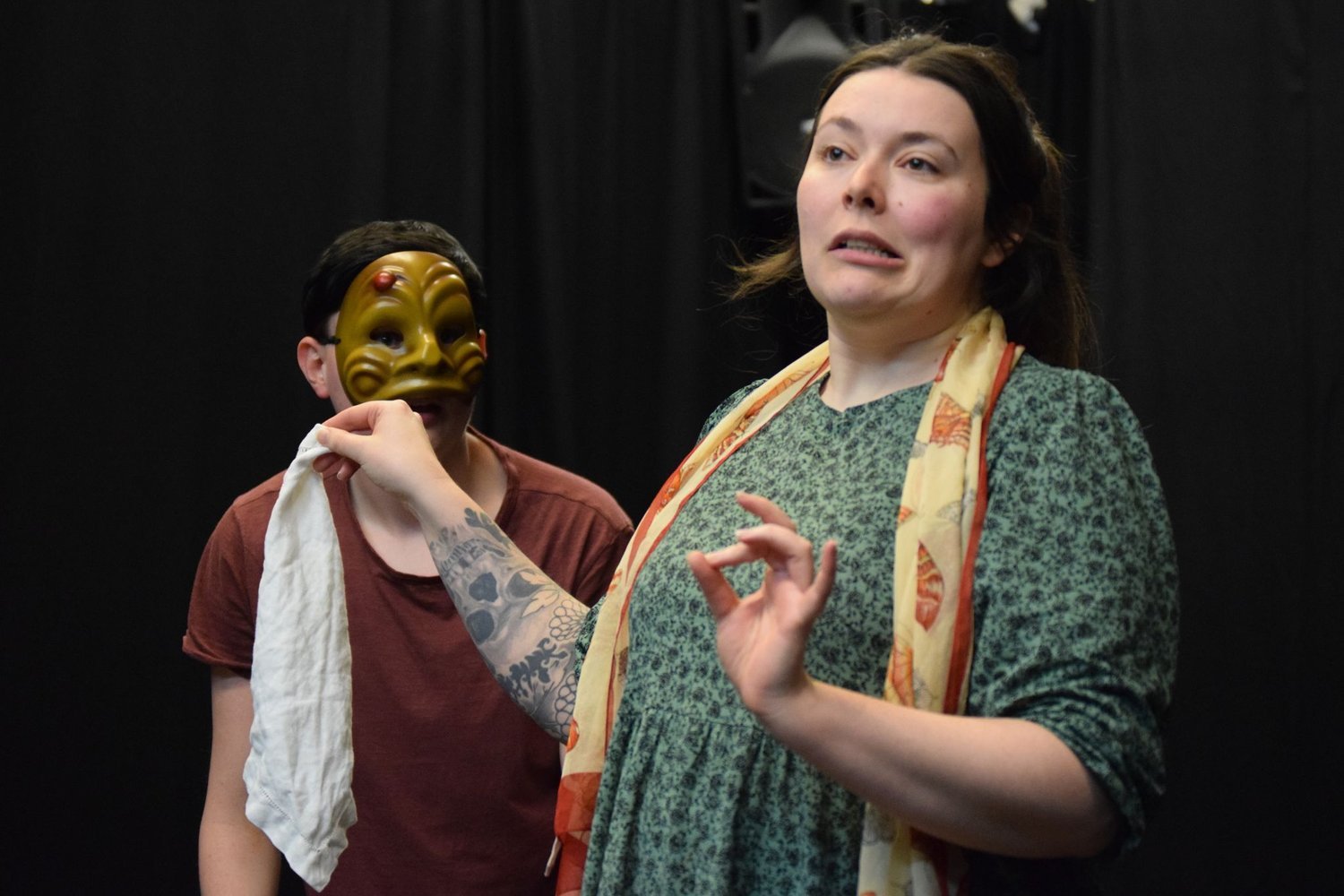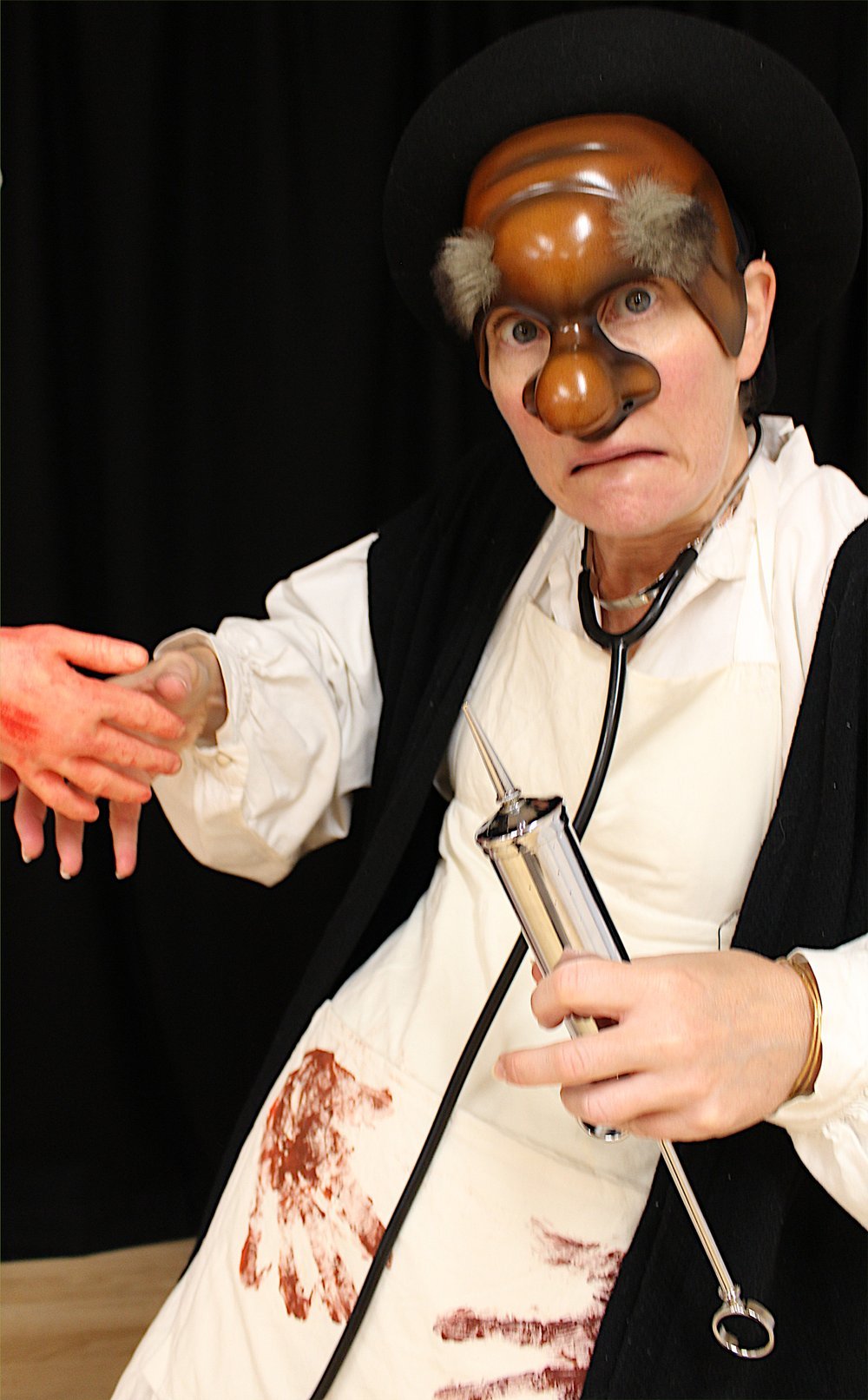 Image 1 of 3
Image 1 of 3

 Image 2 of 3
Image 2 of 3

 Image 3 of 3
Image 3 of 3




Introduction to Commedia dell'Arte - with Cheryl Stapleton
Saturday 11th January from 10.30am - 4.30pm
This workshop will introduce you to the most familiar Commedia dell’Arte archetypes including the cheeky trickster, the blundering fool and the narcissistic braggart. Always guaranteed to generate belly laughs, this workshop will stretch you to explore the exaggerated characterisation required to bring these stock characters to life and will teach you the essentials of creating comedy on stage.
The workshop will cover:
Key principles of mask work, staging and the actor-audience relationship
The origins of the Commedia characters, developing a specific repertoire for each with movement, voice, behaviour and mannerisms
The voice of the mask using the breath, grummelot (gibberish language), stock speeches and song
Classic lazzi, comic techniques and slapstick sequences
Ways into devising and creating scenarios
Key Take-Aways
For actor-theatre makers, Commedia dell’Arte performance skills are part of the foundations of stage performance, encouraging you to develop:
physical stamina and articulation;
control of tempo-rhythm and tension states;
understanding of spatial awareness, the ensemble and the relationship to the audience.
For teachers, taking these Commedia skills back into your classroom, you will find that it stretches and challenges every student, often enabling the less confident to find a voice and ability to leap onto the stage with joy.
“A fantastic introduction or revision of Commedia to inspire you and give you confidence in your understanding… Super! Amazing value for money! Superbly led by Cheryl who is an expert and really clearly communicates and shares both her knowledge and passion.”
— D. OLIVER, QUEEN ELIZABETH'S SCHOOL, DEVON
About Commedia:
Commedia dell’Arte is a 16th century comic style, born in Italy, featuring masked and unmasked characters. Known as the first ‘professional’ acting style, the influence of this important theatrical form can be traced through Elizabethan drama, French farce, opera, ballet, mime, silent movies and throughout the history of comedy. Commedia dell’Arte is taught in many drama schools as a movement foundation for all styles of acting. It is a brilliantly inclusive style that will stretch and challenge every student.
About the Workshop Leader:
This workshop will be led by Cheryl Stapleton. Cheryl trained in physical theatre and comedy at École Philippe Gaulier and in 1995, set up her first theatre company, Kabosh, devising and performing Commedia dell’Arte street theatre productions. Over the past twenty-five years, Cheryl has worked and trained with many leading mask and physical theatre practitioners, including Antonio Fava, Marcello Magni, John Rudlin, Olly Crick and Michael Chase. She is a qualified teacher and taught for seven years in London, Wiltshire and the Cotswolds, where she now lives. As Learning Through Theatre, Cheryl performs, directs and delivers workshops, both in studio and online. She has been delivering CPD for the past four years to compliment workshops run in schools internationally with clients such as RADA, Fourth Monkey, University College London, University of Gloucestershire, Circomedia, The Actors’ Workshop, Loreto College Network, The Actors’ Institute, Berlin Metropolitan School, International School of Amsterdam and International School of Vienna.
Saturday 11th January from 10.30am - 4.30pm
This workshop will introduce you to the most familiar Commedia dell’Arte archetypes including the cheeky trickster, the blundering fool and the narcissistic braggart. Always guaranteed to generate belly laughs, this workshop will stretch you to explore the exaggerated characterisation required to bring these stock characters to life and will teach you the essentials of creating comedy on stage.
The workshop will cover:
Key principles of mask work, staging and the actor-audience relationship
The origins of the Commedia characters, developing a specific repertoire for each with movement, voice, behaviour and mannerisms
The voice of the mask using the breath, grummelot (gibberish language), stock speeches and song
Classic lazzi, comic techniques and slapstick sequences
Ways into devising and creating scenarios
Key Take-Aways
For actor-theatre makers, Commedia dell’Arte performance skills are part of the foundations of stage performance, encouraging you to develop:
physical stamina and articulation;
control of tempo-rhythm and tension states;
understanding of spatial awareness, the ensemble and the relationship to the audience.
For teachers, taking these Commedia skills back into your classroom, you will find that it stretches and challenges every student, often enabling the less confident to find a voice and ability to leap onto the stage with joy.
“A fantastic introduction or revision of Commedia to inspire you and give you confidence in your understanding… Super! Amazing value for money! Superbly led by Cheryl who is an expert and really clearly communicates and shares both her knowledge and passion.”
— D. OLIVER, QUEEN ELIZABETH'S SCHOOL, DEVON
About Commedia:
Commedia dell’Arte is a 16th century comic style, born in Italy, featuring masked and unmasked characters. Known as the first ‘professional’ acting style, the influence of this important theatrical form can be traced through Elizabethan drama, French farce, opera, ballet, mime, silent movies and throughout the history of comedy. Commedia dell’Arte is taught in many drama schools as a movement foundation for all styles of acting. It is a brilliantly inclusive style that will stretch and challenge every student.
About the Workshop Leader:
This workshop will be led by Cheryl Stapleton. Cheryl trained in physical theatre and comedy at École Philippe Gaulier and in 1995, set up her first theatre company, Kabosh, devising and performing Commedia dell’Arte street theatre productions. Over the past twenty-five years, Cheryl has worked and trained with many leading mask and physical theatre practitioners, including Antonio Fava, Marcello Magni, John Rudlin, Olly Crick and Michael Chase. She is a qualified teacher and taught for seven years in London, Wiltshire and the Cotswolds, where she now lives. As Learning Through Theatre, Cheryl performs, directs and delivers workshops, both in studio and online. She has been delivering CPD for the past four years to compliment workshops run in schools internationally with clients such as RADA, Fourth Monkey, University College London, University of Gloucestershire, Circomedia, The Actors’ Workshop, Loreto College Network, The Actors’ Institute, Berlin Metropolitan School, International School of Amsterdam and International School of Vienna.

